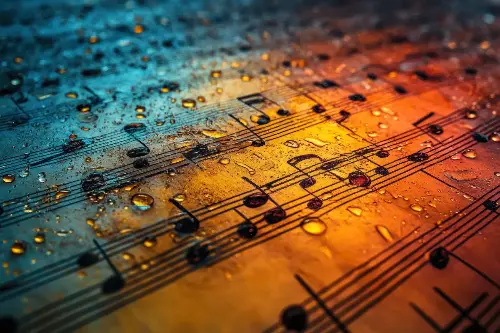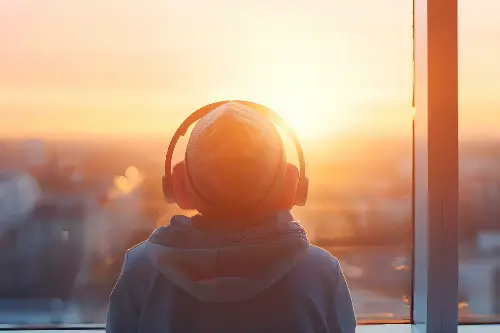We've all experienced it—that moment when a particular melody wafts through the air and suddenly we're transported back in time. A cascade of vivid memories floods our mind, and emotions we thought were long buried come bubbling to the surface. It's as though music holds a mystical power over our past, but this phenomenon isn't just poetic romanticism; it's a fascinating interplay of neuroscience and the human experience.

The Lyrical Time Machine
Music's ability to evoke memories is largely tied to its connection with our emotions and our senses. When we hear music, it engages not only the auditory system but also areas of the brain that are linked with emotional processing and memory recollection. Songs from our past serve as a soundtrack for a mental movie that plays the scenes of our life experiences—whether it be the lullaby our mother sang, the first dance at a wedding, or a tune that accompanied road trips with friends.
Experts believe that because music is often associated with significant emotional events in our lives, it becomes tightly woven into our autobiographical memories. It's a phenomenon that psychologists refer to as the "reminiscence bump," where our brains tend to hold onto memories from adolescence and early adulthood with greater clarity and emotional resonance. Music from these periods tends to be powerful in summoning recollections from the past.

The Role of Rhythm and Melody
But what is it about the rhythm or melody that makes such a strong connection to memory? Research indicates that rhythm can have a profound influence on the brain, triggering patterns of neuronal activity that facilitate the recollection of memories. Experts note that the predictability of rhythm provides a framework that our brains can latch onto, helping to enhance coordination between the regions involved in memory processing.
Melody, on the other hand, works its magic through the tunes that get etched into our memories. Melodies often evoke emotions, and these emotional reactions are key in memory formation. The limbic system, the part of the brain that processes emotions, works in tandem with the hippocampus—a critical hub for memory—to encode and retrieve the nuanced memories associated with music.

The Science of Nostalgia
When music triggers a memory, a flurry of brain activity ensues. Nostalgia, that bittersweet emotion that often accompanies music-induced reminiscing, involves several brain regions. Studies employing functional magnetic resonance imaging (fMRI) have shown that songs linked to personal memories activate the brain's default mode network—a set of connected regions involved in internal thought and recollection.
Furthermore, the prefrontal cortex, particularly the medial prefrontal section, plays a key role in translating the emotional values of music into meaningful personal experiences. When a song sparks nostalgia, it's like a neural highlighter pen drawing our attention to the moments that define us.

Music Therapy: Harnessing Melodies for Healing
Given music's profound impact on memory, it's perhaps unsurprising that it's used therapeutically in the form of music therapy. Professional music therapists utilise tunes to access memories that might otherwise be unreachable, particularly for individuals dealing with conditions such as dementia or depression. Music has the potential to calm, to stimulate, and to bring to the surface emotions that need to be processed for healing to occur.
Notably, with patients of Alzheimer's disease and other forms of dementia, music from their formative years can sometimes elicit startling responses, prompting conversations and interactions that had become infrequent. It's as though the music serves as a key unlocking doors that seemed firmly shut.

The Universal Language of Humanity
With music being a universal language crossing cultural and societal barriers, it's fascinating to see how universally this memory phenomenon occurs. It reminds us that no matter what corner of the globe we hail from, our brains and hearts are hardwired to interlink memories with melodies.
Moreover, it's not just individual memories that music can awaken. Historical and cultural recollections are often preserved and passed down through songs, connecting us to our shared heritage and ancestry. This is evident in folk music styles that have transcended centuries, carrying stories and traditions through the ages.
A Future Tuned to the Past
As we continue to explore the harmonies of our history, both personally and collectively, we unlock new insights into the power of music. Experts are delving deeper into its therapeutic potentials, its capacity to connect, and its ability to preserve and renew our most cherished memories. Whether we are listeners or musicians, amateurs or aficionados, the tunes we treasure act as emotional bookmarks that remind us of where we've been—and sometimes, they guide us towards where we need to go.
In this symphony of life, each note plays a part in the concerto of our memories, resonating through the soul with a melody that is uniquely our own. The music of the past is always there, waiting for us to hit play, reawakening the echoes of moments we've lived and the feelings that accompanied them. It seems that in every cadence, every beat and every harmony, there is a story—a fragment of time preserved in the harmonies of the past.
